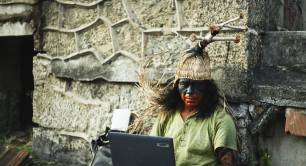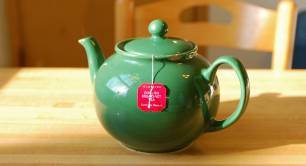Prince Charles hosts a social enterprise dinner
Unilever's Sustainable Living Young Entrepreneurs Awards was hosted at Buckingham Palace this year, once a threating territory for innovators. But these days you can't beat a palace for an attention-grabbing venue. Isabelle de Grave was there.
It's unusual to find social innovators dining at Buckingham Palace. There's a good reason for this. In 15th Century England, if a monarch sought the company of a social innovator, it wasn't for a champagne reception. It was for a one on one with the executioner.
Innovation was a deviant behaviour, a threat to the established order and a capital offence. Now, as social entrepreneurs conspire to disrupt ‘the system’, they win support from progressive princes and CEOs.
Dirty drinking water and Eton mess
At Unilever's Sustainable Living Young Entrepreneurs Awards, elegantly dressed environmentalists, executives and social entrepreneurs made their way up the curving marble stairs and into the royal picture gallery. Here priceless portraits looked over a mingling of worlds, ethics and values, politely aligning for the evening.
A three-course dinner followed, where seven young social entrepreneurs showcased ingenious answers to social problems principally in Asia and Africa. They brought solutions to open defecation and dirty drinking water to the table, as silver service waiters served steaks and Eton mess (a traditional English dessert made with strawberries, merigue and cream). Under Edward VI, who issued a declaration 'Against Those That Doeth Innouate', this would have been close to treason. But Prince Charles set his audience at ease. "The Queen isn't here," he said, "and that's why you've all been let in".
And the winner is...
Prince Charles went on to announce that the winner of the €50.000 prize money was Gamal Abinsaid for his venture, Garbage Clinical Insurance (GCI). Abinsaid's initiative is a gem of an idea for health service provision in Indonesia. It allows people who can’t afford to see a doctor to trade household waste for healthcare. A month’s worth of waste can reach close to 10,000 Indonesian rupiah (€0.60). Clinics process or sell the waste, which has allowed them to recruit 88 volunteers, 15 doctors and 12 nurses.
Though waste may be incongruous with palatial grandeur, it's a key concern for Unilever; one of seven pillars of change, at the heart of its sustaiability plan. So, GCI fits well with current projects.
Since 2012, ‘Domestos toilet academies’ in Vietnam have trained local entrepreneurs to set up hygienic toilet businesses. And there's also the story of a Unilever research project that grew into the Clean Team, a social enterprise in Ghana that rents portable toilets to families. Like GCI the Clean Team seeks a profit from waste. They convert it into energy and organic fertiliser, sell it to commercial farms in the region, and reinvest it in the business.
Would Unilever have faced capital punishment?
All Unilever brands develop their own approaches to helping the company achieve its Sustainable Living Plan. This means products like Lifebuoy soap engage with the issue of diarrhoeal and respiratory disease and Dove sets out to boost women's self-esteem.
But while some excel, others lag. And Paul Polman, Unilever's CEO, patiently oversees the change process. This was the impression he gave in a debate last year with environmentalist and director of Forum for the Future Jonathan Porrit. Polman said that he would never oust a brand for ignoring social and environmental concerns. And he would never force them into a course of action.
In spite of Porrit's frustration with this approach, Polman said he refused to be autocratic. His aim, he explained, was to listen to brands, and keep pushing them. "Abandoning them would be the easy way out," he said. So it's evolution for Polman, not revolution.
A revolutionary future for Garbage Clinical Insurance?
But, what if Unilever were to treat the latest award winner like one of its own brands? This could cause a revolutionary stir. Take Unilever’s purchase, Dorset Cereals, for example. Once a cardboard container full of dusty oats, now one of the most tempting cereal boxes on the shop shelf.
Abinsaid's Garbage Clinical Insurance and Dorset Cereals are quite literally worlds apart. But what if Unilever supported its awardee with the same vigour it uses to take its own brands to market? What if the multinational absorbed the values of the social enterprise? This would set a dangerous new precedent for corporate and social enterprise partnership.
Unilever and the Cambridge Programme for Sustainability Leadership (CPSL) launched the Unilever Sustainable Living Young Entrepreneurs Awards in 2013. The new programme will be launched early in the Summer of 2014 and young entrepreneurs can register on the Ashoka Changemakers platform.



